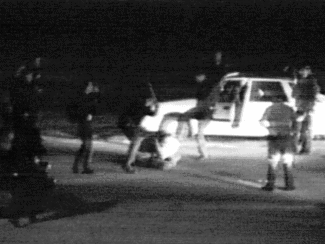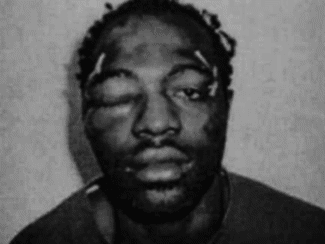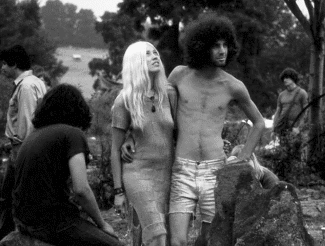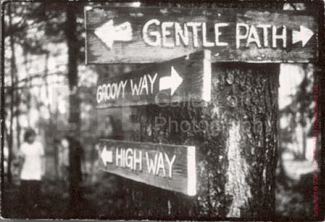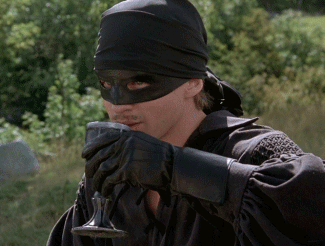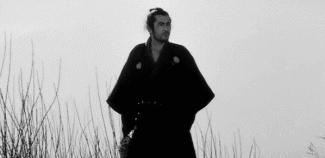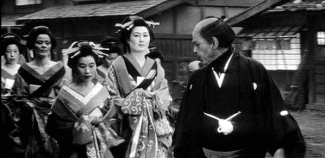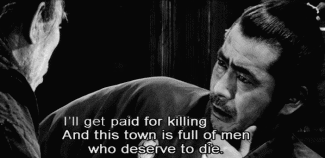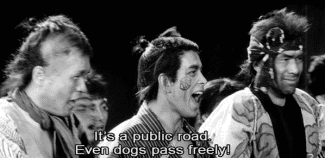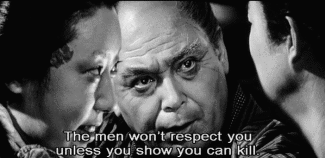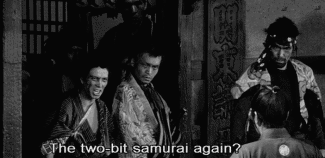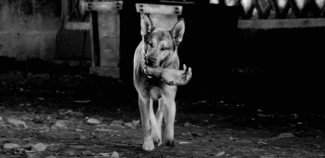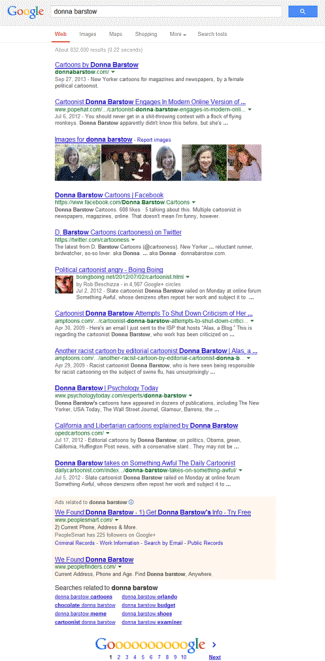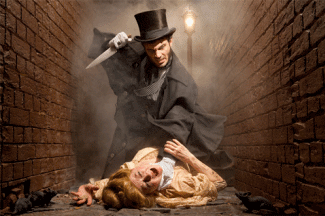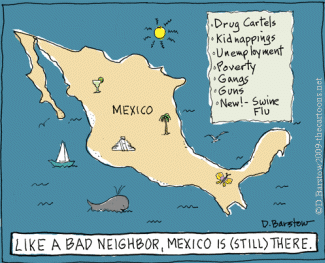Sparking Up A Cyber-Frankenstein: Pushing Yellow Journalism to the Megacrowdby Charles Carreon
August 12, 2013
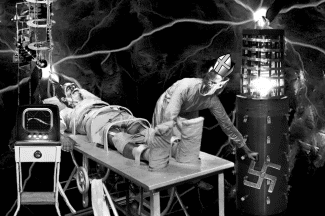 Popehat does the thing he should not do, and creates the being that should not exist.
Popehat does the thing he should not do, and creates the being that should not exist.Vampires are big today, but in the movieland of my childhood, Frankenstein was the Big Kahuna. True, Dracula was frightening, in a very creepy way, but he was also limited in his ability to inflict harm. Somewhat like the bishop in chess, who is limited to either the white or the black squares, Dracula was allergic to sunlight, garlic and crosses. Not Frankenstein, who strode about in broad daylight, seemed omnivorous, and could be relied upon to turn a crucifix into a club with great swiftness. The movie-monster Frankenstein of my childhood was mindlessly animate, in gear and on target. Once he discovered that he was not wanted by humans, he became utterly insensible to the suffering of human beings. Poor beast, to be so misunderstood, when he meant no harm! How touching, the scene where he sways entranced before the old, blind violinist, who doesn’t fear him because he can’t see him, and his granddaughter, whose innocence allows the monster to experience human kindness once. Then, never again!
From a classical moral perspective, what is wrong with Frankenstein is that he should not have been created, and his maker committed a mortal folly when he dared to frame a simulation of a man’s body from bits of corpses. Frankenstein has no soul, and is a cursed being, brought into existence by the hubris of a young man too eager to scale the pinnacles of scientific achievement without prior reflection on the moral consequences of his “creation.”
While it is fortunately impossible to duplicate the feat Mary Shelley premised her novel upon, it is still possible for clever persons to conjure new minds into existence. Every speaker who draws a crowd conjures a crowd mind into existence. This is not a metaphor, but a reality. A crowd has a body that flows like water, as nicely illustrated by this
Black Friday crowd cascading into an Urban Outfitters. The physical strength of a crowd aggregates, causing people to feel less vulnerable to counterattack in a crowd, and therefore more willing to engage in attack. See the example of some very pugnacious conduct at the leading edge of an English crowd
at this link.
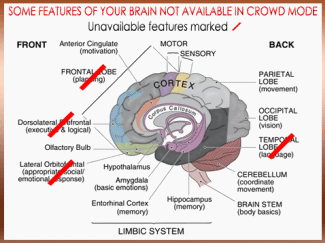
A crowd mind is missing some of the features of the individual minds from which it arises. As I explained in a prior post, due to
the Pizza Effect, the crowd mind is composed only of those mental faculties that aggregate, like physical strength and emotion, and lacks intellectual ability, that does not aggregate. So when you are feeling like everyone else in the crowd, you are dumber than usual, because you are no smarter than anyone else in the crowd. When Isaac Asimov invented the science of “psychohistory,” he was relying on the Pizza Effect when he said that although the behavior of individuals could not be predicted, the behavior of large numbers of people could –- because the aggregate of their impulses was a much more limited universe of possibilities than the impulses of a single individual. One impact of
the Pizza Effect on our society is, in fact, that people eat a lot of pizza; indeed, the volume of pizza eaten in the United States has grown every year since it appeared on the market after the Second World War. Asimov would have predicted it, easily, if he’d ever bothered to give it thought.
Sometimes nations behave like organizations capable of deliberate behavior. Governments try to act cool and collected when they confront a crisis, but at the core, there is a fear of the people degenerating back into a crowd, a mob without clear purpose, but filled with urgent needs. During the last decade, one nation after another has seen the organized surface of governments convulse, revealing the seething human crowd mind, aggregating only frustration, fear, and demand, looking for guidance from some source. And those who are willing to provide guidance to a crowd can never be trusted.
There must have been nothing more satisfying for William Randolph Hearst than to know that he’d started another war and his friends at the Bohemian Grove were going to be damned happy about it. It seems he was confident about his ability to deliver an international incident on schedule:
In 1897, prior to the sinking of the U.S.S. Maine, Frederic Remington, an artist hired by William Randolph Hearst, publisher of the New York Journal, went to Cuba with noted writer Richard Harding Davis to provide illustrations to accompany a series of articles on the Revolution. Arriving in Havana in January of 1897, Remington soon became bored with seemingly peaceful Cuba and wired Hearst:
“Everything is quiet. There is no trouble. There will be no war. I wish to return.”
Hearst’s reply is alleged to have been:
“Please remain. You furnish the pictures and I’ll furnish the war.”
http://lasparanoias.blogspot.com/2007/1 ... iracy.html
So to take a lesson on how to inflame the masses with lies, we must examine Hearst. In “A Moment in the Sun,” author John Sayles assumes Hearst’s viewpoint in the opening to a chapter entitled “The Daily Outrage,” giving an insight into how Hearst caused newsboys to spread blatant, inflammatory lies by using a clever typographical trick, a “split” headline, that is, one written in two point-sizes, like this one:
AMERICAN GENERALS WANT
MORE TROOPS IF WE ARE
TO FIGHT SPAIN
Sayles implies that Hearst printed it that way so the urchins who hawked his papers would stand on street corners yelling, “AMERICAN GENERALS WANT TO FIGHT SPAIN!” This is a compelling insight into one of Hearst’s clever tools for inflicting his version of reality on all of society. Through third parties like newsboys who abbreviated “split heads” to produce a false statement, he got to say things he couldn’t say himself.
As a summary of the most common lies told about me by 105 Rapeutationists
http://rapeutation.com/rapeumain.rapeutationists.htm clearly shows, if you believed
all the lies told about me with respect to the Oatmeal litigation, you’d have an entirely false version of events and of me. Since all of the 105 Rapeutationists listed on the chart reinforce each other’s credibility with mutual backpatting in cross-comments on each other’s blogs, the cross-pollination of their intellects is too slavish to entertain criticism. Thus, they have no motive to point out errors in the Charles Carreon story on their buddy’s blog. Indeed, any tendency toward criticism of other Rapeutationists would be rejected automatically as counter-rapeutational behavior that one might have to account for. Rapeutationing is not peer review. Rapeutationing means conducting a distributed disinformation campaign against a person who, seen in a truthful light, deserves no abuse whatsoever, in order to justify the abuse. The Rapeutationists cannot credibly say, “Well, everybody would have hated you anyway, even if they’d known the literal truth,” because they can’t answer this question honestly: “Why would you bother to tell a lie that made no difference?” When it’s a lie that you bother to tell in an article that’s all about shaming Charles Carreon, then we presume you felt it had some “defamatory sting.”
Hearst was such a skillful Father of Lies that he could cause them to be shouted from the lips of innocent “street Arabs,” as homeless children were then known, who fanned the flames of war without a flicker of concern for their actions. Hearst put the machinery of distortion in motion so deftly that no one could attribute ill will to him – as if he should be responsible for the grammatical errors of urchins!
So who is the Father of Lies in my Rapeutation? Well gosh, gee golly, I’m going to go with the undisputed facts, and say “Ken Popehat White!” It’s an honor he’s won by exerting a lot of effort, putting in a lot of time urging people to hate me that he could have spent with his family. But what’s more “family” than trying to destroy someone else’s Dad? So his kid’s probably pretty understanding about “Dad’s hobby.” Kinda cool when you think about it. Unbeknownst to all but a few, he’s a Free Speech Mafioso, character assassin for hire, lead operative on important Rapeutations. To everyone else, he’s just a nice family guy who empties his own garbage and walks the dog.
It’s the volume of work being produced that tips you off that you may be dealing with a professional hatchet-man. As I review the products of research into Popehat, I’m struck by the amount of time spent on the activity, and the very large number of his Rapeutation victims. I gradually have drifted from thinking that it was absurd to imagine he’d be getting paid to conduct Rapeutations to entertaining the possibility in theory, to definitely not ruling it out.
He could be working for somebody steady, like Lenny Sands works for Howard Hughes in James Ellroy’s “American Tabloid,” stalking and exposing Hollywood personalities Hughes wants to pressure for business purposes, or wants to crush because they obstruct his right wing social agendas. Or he could run a sleaze-for-hire shop of that sort that have existed in LA since the first swindlers showed up to sell whatever suckers would pay for. Ellroy’s character Ward Littell, a lawyer/FBI agent who turns from a Kennedy worshipper to a conspirator in his assassination, is the very epitome of a person who traffics in black information, gathered from law enforcement, private investigators and freelance mercenaries at a very high level. Ken Popehat White might be a sort of micro-version of Ward Littell, gathering his information from his “army of Davids,” and spreading his poison through the same network.
Once you have your network of disinformationists, tried and tested in one Rapeutation after another, it works like a well-oiled machine. Like Hearst, Popehat can deliver a DIRA on schedule, and like Hearst, it’s his signature to seize victory by claiming it boldly. The last headline quoted by Sayles delivers the war Hearst promised Remington in his telegram, and is triumphantly brief:
WAR? SURE!
Because the jump from rationality to irrationality must be quick! Once we have been brought to the brink of a calamitous decision by a series of events, each one ringing with national significance, the skillful shaper of the crowd mind presents the decision as a fait accompli.
When we think of the dangers that can befall us when the crowd mind takes action, we should consider that our Congress evermore resembles a frightened crowd, rather than a deliberative body. Remember those heady days in 2001 and 2002 when war fever seized Congress, and all but one Congresswoman acted in unison to issue the “Authorization for Use of Military Force?” A product of the Congressional crowd mind, the AUMF is so broad and ill-drafted that the Obama administration argues that it justifies new laws subjecting Americans to the risk of indefinite detention for vague offenses of the “giving comfort to the enemy” sort, unconstitutionally adopted by Congress in
Section 1021(b) of the National Defense Authorization Act for the Fiscal Year 2012. In one moment of Congressional crowd mind, mistaken for “patriotism,” our elected representatives blotted out two centuries of logically developed, sound constitutional jurisprudence that protected our national integrity and individual liberty. What stampeded the Democratic Congress into giving Bush the AUMF? Why did the nation have to go to war in Iraq? The answer was of the simple sort that even the crowd mind can comprehend: “Because they hate our freedoms.”
When Ken Popehat White, in one of his early screeds contra Carreon, said that “Carreon hates freedom,” he drew from the same well of negative sentiment as George W. Bush when he accused Osama bin Laden of the same offense. What better way to kick off a DIRA? Invoke the spirit of 9/11! When he kicks off a DIRA, Popehat brings a crowd mind into existence that, like Frankenstein, should not exist. It is a crowd mind that is entirely devoted to self-pleasuring, and lacks all moral restraint, exactly like the crowd mind that Derren Brown whipped into existence in less than twenty minutes, inducing the Milgram-Zimbardo effect in record time, in his
Gameshow Experiment. While careful social scientists can certainly find shortcomings in the design of Brown’s “experiment,” given what we already know about the phenomenon of “de-individuation” that leads to the absorption and disappearance of the individual mind in the crowd mind, it can simply be taken as an entertaining demonstration of how a crowd can easily be guided into a series of cruel actions by an engaging host who turns off inhibitions, turns up the arousal, and plays the crowd mind’s simple keyboard with ease.
Crowds are prone to sudden reversals of position, a topic that forms the theme of Shakespeare’s “Julius Caesar.” The Roman mobs have a central role in the play. In the opening scene, members of a crowd celebrating Julius Caesar’s assent to power are reviled by a character whose good sense recoils at the scene. He calls them “you blocks, you stones, you worse than senseless things,” because they had so recently celebrated the rule of Pompey, who was overthrown by Caesar. By the end of the play, Brutus, Cassius, and Caesar’s other killers are being pursued by the mob, whipped into a frenzy by Marc Antony’s deft manipulation of their sentiments.
The pendulum swings of the crowd mind can cause grave social changes, carrying nations into blood-stained revolutions, that fail to resolve the painful causes of the upheaval, until at last crowd-action subsides, and reasoned, humane efforts to address real problems are made. We can see this process in several Latin American countries, like Argentina and Chile, that have staggered unevenly away from the legacy of oligarchical oppression.
It is hard to realize that crowd mind is really not much good for anything besides having a good time at a concert or game. When the game spills out of the stadium and turns into a soccer mob, there’s no benefit to anyone, and danger to many. Nevertheless, we have entered the age of mass social control through the Internet, and we are going to see a great deal more crowd-mind activity, and an increasing frustration from a growing number of just plain folks who know that you can’t run a society in which rapeutations can be conducted with impunity, destroying the economic viability of individuals and businesses, because of the whimsical, malicious behavior of a relatively small proportion of Internet users who use and abuse the substantial margin of privilege secured to them by the good offices of the Free Speech Mafia.
Often, the realization that crowd mind is out of control prompts a swing away from anarchy, toward fascism, in the crowd mind itself. There is no possibility of self-reflection in a crowd, giving rise to the realization that it is acting irrationally. It is elementary crowd psychology that crowds do today what they regret tomorrow. So those who fan the flames of anarchy, who encourage youth to man the barricades and occupy the parks and public places, are often discovered, when the cycle of history has turned once again, to have been but agent provocateurs for the forces of oppression.
Popehat’s short term agenda is to turn the Internet into a place where no one can find refuge from the rage of a crowd that wants more than anything to feel its own power, to confirm its own existence by making a mark. Popehat’s long term agenda is likely more typical of persons who indulge, as Hearst did and he does, in bellicose tub-thumping, while wrapping himself in constitutional virtue – a return to tyranny, designed by reliable old white guys who look just like Ken Popehat White.




